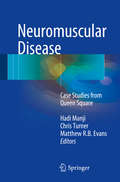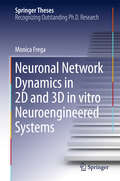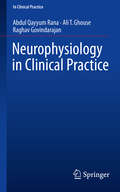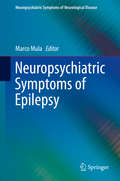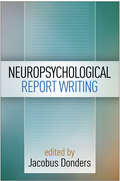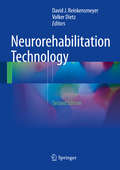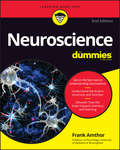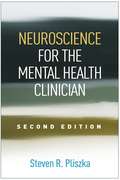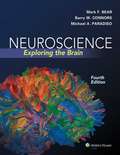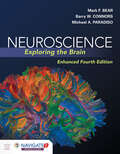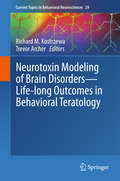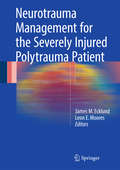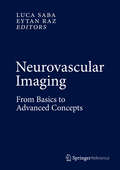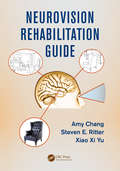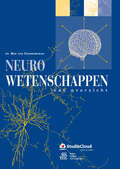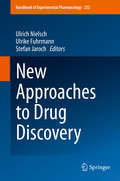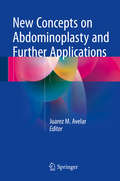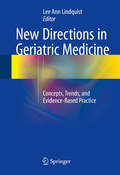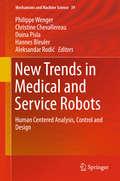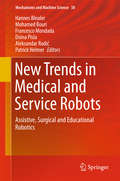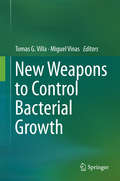- Table View
- List View
Neuromuscular Disease
by Chris Turner Hadi Manji Matthew R. B. EvansThis book provides an accessible guide to neuromusculardisorders using case scenarios from the world-renowned MRC Centre forNeuromuscular Diseases at the National Hospital, Queen Square, London, UK. Fiftygenetic and acquired disorders are presented in a practical, easy-to-readformat, including those that are common and also some which are rare. Each case covers the history, examination andinvestigations, including neurophysiology, neuroradiology and neuropathology ifappropriate. Discussions of each case include the differential diagnosis,useful clinical pointers and a brief summary of the management of thecondition. Neuromuscular Disease:Case Studies from Queen Square is aimed at neurology trainees andconsultant general neurologists.
Neuronal Network Dynamics in 2D and 3D in vitro Neuroengineered Systems
by Monica FregaThe bookpresents a new, powerful model of neuronal networks, consisting of athree-dimensional neuronal culture in which 3D neuronal networks are coupled tomicro-electrode-arrays (MEAs). It discusses the main advantages of thethree-dimensional system compared to its two-dimensional counterpart, and showsthat the network dynamics, recorded during both spontaneous and stimulatedactivity, differs between the two models, with the 3D system being better ableto emulate the in vivo behaviour of neural networks. The book offers anextensive analysis of the system, from the theoretical background, to itsdesign and applications in neuro-pharmacological studies. Moreover, itincludes a concise yet comprehensive introduction to both 2D and 3D neuronalnetworks coupled to MEAs, and discusses the advantages, limitations andchallenges of their applications as cellular and tissue-like in vitro experimental model systems.
Neurophysiology in Clinical Practice
by Abdul Qayyum Rana Ali T. Ghouse Raghav GovindarajanThis handbook provides a concise up to date review in interpreting electroencephalography and electromyography using simple illustrations. The book has been divided into two sections. Section 1 describes electroencephalography and Section 2 discusses electromyography and nerve conduction studies. Each chapter has been carefully drafted to provide the most up to date accurate information in an easy to understand format interspersed with diagrams and tables where needed. This book is aimed at trainees doing their neurophysiology rotation, general neurologists, general practitioners, advanced practice providers and neurophysiology technicians.
Neuropsychiatric Symptoms of Epilepsy
by Marco MulaThis book is an up-to-date, comprehensive review of the neuropsychiatry of epilepsy, by active authorities in the field, with an emphasis on clinical and management issues. A critical appraisal of the methodology and limitations of current research on the neuropsychiatry of epilepsy is provided, and unanswered questions and controversies are addressed. Pharmacological aspects of management are also discussed in order to enable the reader to manage these patients more safely. Neuropsychiatric Symptoms of Epilepsy is aimed at neurologists, epileptologists, psychiatrists and neuropsychiatrists, and will also be of interest to psychologists and neuropsychologists, research and specialist nurses, clinical researchers and methodologists.
Neuropsychological Report Writing (Evidence-Based Practice in Neuropsychology)
by Jacobus DondersAll neuropsychologists need to know how to produce evidence-based reports. This book brings together experts to provide an in-depth guide to high-quality report writing in a range of contexts, including evaluations of older adults, psychiatric patients, those with complex medical conditions, schoolchildren, and others. It reviews the fundamental elements of a clinical neuropsychological report and shows how to tailor findings, conclusions, and recommendations to particular audiences, such as referring physicians, school professionals, and legal decision makers. Of special utility, every chapter features excerpts of sample reports, including examples of strong and poor documentation of the same material.
Neurorehabilitation Technology
by Volker Dietz David J. ReinkensmeyerThisrevised, updated second edition provides an accessible, practical overview ofmajor areas of technical development and clinical application in the field ofneurorehabilitation movement therapy. The initial section provides a rationalefor technology application in movement therapy by summarizing recent findingsin neuroplasticity and motor learning. The following section thenexplains the state of the art in human-machine interaction requirements forclinical rehabilitation practice. Subsequent sections describe the ongoingrevolution in robotic therapy for upper extremity movement and for walking, andthen describe other emerging technologies including electrical stimulation,virtual reality, wearable sensors, and brain-computer interfaces. The promisesand limitations of these technologies in neurorehabilitation are discussed. Throughout the book the chapters provide detailed practical information onstate-of-the-art clinical applications of these devices following stroke,spinal cord injury, and other neurologic disorders. The text is illustratedthroughout with photographs and schematic diagrams which serve to clarify theinformation for the reader. NeurorehabilitationTechnology, Second Edition is a valuableresource for neurologists, biomedical engineers, roboticists, rehabilitationspecialists, physiotherapists, occupational therapists and those training inthese fields.
Neuroscience For Dummies
by Frank AmthorGet on the fast track to understanding neuroscience Investigating how your senses work, how you move, and how you think and feel, Neuroscience For Dummies, 2nd Edition is your straight-forward guide to the most complicated structure known in the universe: the brain. Covering the most recent scientific discoveries and complemented with helpful diagrams and engaging anecdotes that help bring the information to life, this updated edition offers a compelling and plain-English look at how the brain and nervous system function. Simply put, the human brain is an endlessly fascinating subject: it holds the secrets to your personality, use of language, memories, and the way your body operates. In just the past few years alone, exciting new technologies and an explosion of knowledge have transformed the field of neuroscience--and this friendly guide is here to serve as your roadmap to the latest findings and research. Packed with new content on genetics and epigenetics and increased coverage of hippocampus and depression, this new edition of Neuroscience For Dummies is an eye-opening and fascinating read for readers of all walks of life. Covers how gender affects brain function Illustrates why some people are more sensitive to pain than others Explains what constitutes intelligence and its different levels Offers guidance on improving your learning What is the biological basis of consciousness? How are mental illnesses related to changes in brain function? Find the answers to these and countless other questions in Neuroscience For Dummies, 2nd Edition
Neuroscience for the Mental Health Clinician, Second Edition
by Steven R. PliszkaAccessible and succinct, this book has given thousands of clinicians and students the basic understanding of neuroscience that is essential in contemporary mental health practice. Steven R. Pliszka synthesizes current knowledge on the neurobiological bases of major psychiatric disorders. He explores the brain systems that underlie cognition, emotions, and behavior; how disturbances in these systems can lead to psychopathology; and the impact of genetic and environmental risk factors across development. The book also addresses the ways that both pharmacological and psychosocial treatments act on the brain as they bring about a reduction in symptoms. Illustrations include 93 black-and-white figures and 14 color plates. New to This Edition *Incorporates over a decade of important advances in brain science. *Heightened focus on brain networks replaces a deficit-based understanding of disorders. *Cutting-edge discussions of genetics and epigenetics, the biological impact of stress, neurotransmitters, novel depression treatments, and other timely topics. *Detailed chapters on autism spectrum disorder and dementia. *Numerous new and revised figures.
Neuroscience: Exploring The Brain (Fourth Edition)
by Mark F. Bear Michael A. Paradiso Barry W. ConnorsAcclaimed for its clear, friendly style, excellent illustrations, leading author team, and compelling theme of exploration, Neuroscience: Exploring the Brain, 4e takes a fresh, contemporary approach to the study of neuroscience, emphasizing the biological basis of behavior. The authors' passion for the dynamic field of neuroscience is evident on every page, engaging students and helping them master the material. In just a few years, the field of neuroscience has been transformed by exciting new technologies and an explosion of knowledge about the brain. The human genome has been sequenced, sophisticated new methods have been developed for genetic engineering, and new methods have been introduced to enable visualization and stimulation of specific types of nerve cells and connections in the brain. The new Fourth Edition has been fully updated to reflect these and other rapid advances in the field, while honoring its commitment to be student-friendly with striking new illustrations, additional animations, and an unparalleled array of online resources.
Neuroscience: Exploring the Brain, Enhanced Edition
by Mark Bear Barry Connors Michael A. ParadisoAcclaimed for its clear, friendly style, excellent illustrations, leading author team, and compelling theme of exploration, Neuroscience: Exploring the Brain, Fourth Edition takes a fresh, contemporary approach to the study of neuroscience, emphasizing the biological basis of behavior. The authors’ passion for the dynamic field of neuroscience is evident on every page, engaging students and helping them master the material. In just a few years, the field of neuroscience has been transformed by exciting new technologies and an explosion of knowledge about the brain. The human genome has been sequenced, sophisticated new methods have been developed for genetic engineering, and new methods have been introduced to enable visualization and stimulation of specific types of nerve cells and connections in the brain. The Fourth Edition has been fully updated to reflect these and other rapid advances in the field, while honoring its commitment to be student-friendly with striking new illustrati
Neurotoxin Modeling of Brain Disorders -- Life-long Outcomes in Behavioral Teratology
by Richard M. Kostrzewa Trevor ArcherThis book is authored by leading experts who made major discoveries in neuroteratology research focused on modeling human neural developmental disorders. Individual chapters address ADHD (attention-deficit hyperactivity disorder), Lesch-Nyhan disease, psychoses and schizophrenia, autism, and models of Parkinson's Disease and tardive dyskinesia. The effects of perinatal stress and agonist insults on life-long outcomes are addressed, as well as the overall effects of perinatal neurotoxins on development of specific neural phenotypic systems. The book provides a unique compendium on how perinatal insults of various types can produce effects in brain that persist throughout the life span. Researchers can derive insight into experimental approaches in this research field; clinicians can develop insights into the influences of the many noxious and seemingly innocuous substances that might influence brain development in children.
Neurotrauma Management for the Severely Injured Polytrauma Patient
by James M. Ecklund Leon E. MooresThis text addresses many of the questions which occur when medical professionals of various disciplines interact and have different plans and interventions, each with its own valid scientific and/or experience-based rationale: Questions involving tourniquet placement, ideal fluids and volumes for resuscitation, VTE prophylaxis and many other management considerations. Straightforward decisions in the patient with a single diagnosis often conflict when applied to the neurologically injured polytrauma patients. Neurotrauma Management for the Severely Injured Polytrauma Patient answers as many of these questions as possible based on the current literature, vast experience with severe neurotrauma in the current conflicts in Afghanistan and Iraq, and the experience of trauma experts across the globe as well as proposes areas for future study where answers are currently less clear.
Neurovascular Imaging
by Luca Saba Eytan RazVascular Neurology, Vascular Neurosurgery and Interventional Neuroradiology are independent fields with dedicated Training Programs. Neuroimaging, and in particular what we call "Neurovascular Imaging" is a unifying factor which can be considered the intersection of these three medical specialties. With this book we aim to cover thoroughly the imaging techniques, potentialities, and present and future applications as applied to all the vascular diseases of the central nervous system from the imaging point of view. This book will comprise eight main sections: (1) The Basics, (2) Arteries of the Head and Neck (3) The basics of Intracranial Arteries (4) Diseases of the vessels (5) Stroke Imaging (6) Veins Imaging (7) Spine Imaging (8) Pediatrics.
Neurovision Rehabilitation Guide
by Amy Chang Xiao Xi Yu Steven E. RitterNeurovision Rehabilitation Guide is a valuable resource for the health care professional working with patients with visual dysfunction as a consequence of traumatic brain injury and neurological disorders. It covers the concepts of visual dysfunction as well as assessment and step-by-step treatment plans. <P><P>The guide covers the neurology of visual processing before and after a brain injury. It explains the concepts behind neurovision rehabilitation and how to go about examining and treating the patient’s visual deficits. It also covers the evaluation of visual perceptual deficits and treatment of the traumatic brain injury patient. <P><P>The guide contains more than 80 vision therapy procedures, with step-by-step instructions as well as sequencing guides for each category of therapy (oculomotor, accommodation, binocular, perceptual).
Neurowetenschappen: een overzicht
by Ben Cranenburgh'Neurowetenschappen, een overzicht', is het eerste deel van de vierdelige reeks 'Toegepaste neurowetenschappen'. Het boek geeft een overzicht over het immense gebied van de neurowetenschappen en kan beschouwd worden als een basistekst met een sterk praktische signatuur. Opvattingen over zenuwstelsel en hersenen worden vanuit veel invalshoeken belicht, o. a. vanuit de neuroanatomie, de neurofysiologie, de klinische neurologie, de psychologie en evolutiebiologie. De auteur heeft getracht de werking van het zenuwstelsel op diverse niveaus inzichtelijk te maken: het microniveau (neuron, synaps), het macroniveau (hersengebieden, hemisferen), het mentale niveau (emoties, cognities) en het gedragsniveau (aangepast handelen). Een klassiek fundament van de neurofysiologie, het reflexmodel, wordt in dit boek gerelativeerd en genuanceerd: menselijk gedrag is niet alleen maar reactief, maar kan ook spontaan geinitieerd zijn. De hersenen verwerken en verwekken informatie. Veel simplistische ideeen over de hersenen worden ontzenuwd, bijvoorbeeld de lokalisatie van functies in specifieke centra, het misverstand dat functies als creativiteit en muziek in de rechter hemisfeer gelokaliseerd zijn, het idee dat het volwassen brein niet of minder plastisch zou zijn. Alternatieven die meer in overeenstemming zijn met de huidige opvattingen, worden gepresenteerd. In het boek worden voortdurend verbindingen gelegd met diverse toepassingsgebieden. Motoriek wordt losgemaakt van spieren: de hersenen sturen een 'symphony of movements'. Het belang van zintuiglijke functies bij (het leren van) motorische vaardigheden (sport, muziek, revalidatie) wordt benadrukt, en de plasticiteit van het zenuwstelsel wordt gepresenteerd als biologische basis voor flexibiliteit, adaptatie, ontwikkeling, leren en herstelprocessen. Nieuwe inzichten betreffende de werking van de hersenschors, de lokalisatie van functies in zogenoemde neurale ensembles en hemisfeerspecialisatie kunnen inspireren tot toepassingen op allerlei gebieden. Geregeld komt het 'mind-body'-probleem aan de orde: de onscheidbaarheid van soma en psyche die in het zenuwstelsel zijn biologische basis heeft, wordt met talrijke voorbeelden toegelicht. Het boek geeft voortdurend praktische voorbeelden op het gebied van dagelijks leven, kliniek, therapie, sport, muziek en onderwijs: de auteur heeft getracht de grote kloof tussen neurowetenschappen en praktijk te overbruggen en plaatst daarmee de neurowetenschappen midden in het leven. Kortom, een belangwekkend boek voor medici, paramedici en psychologen, en zeer bruikbaar voor diverse opleidingen. Nu met online verder studeren op StudieCloud door controlevragen en samenvattingen. Ben van Cranenburgh is neurowetenschapper. Hij studeerde geneeskunde in Amsterdam en werkte daarna vele jaren als wetenschappelijk medewerker o. a. bij het Nederlands Centraal Instituut voor Hersenonderzoek (neurofysiologieonderzoek) en bij het Revalidatiecentrum Amsterdam (klinisch onderzoek bij CVA-patienten). In 1987 richtte hij het Instituut voor Toegepaste Neurowetenschappen op (stichting ITON, Haarlem), waar hij tot op heden werkzaam is. In dit kader houdt hij zich intensief bezig met het overbruggen van de (te grote) kloof tussen wetenschap en praktijk, op het gebied van neurorevalidatie, sport en muziek. "
Never Bet Against Occam
by Lawrence B. Afrin Kendra Neilsen Myles Carol Schaengold Kristi Posival Sisters MediaNever Bet Against Occam: Mast Cell Activation Disease and the Modern Epidemics of Chronic Illness and Medical Complexity
New Approaches to Asian History: Epidemics in Modern Asia
by Robert PeckhamEpidemics have played a critical role in shaping modern Asia. Encompassing two centuries of Asian history, Robert Peckham explores the profound impact that infectious disease has had on societies across the region: from India to China and the Russian Far East. The book tracks the links between biology, history, and geopolitics, highlighting infectious disease's interdependencies with empire, modernization, revolution, nationalism, migration, and transnational patterns of trade. By examining the history of Asia through the lens of epidemics, Peckham vividly illustrates how society's material conditions are entangled with social and political processes, offering an entirely fresh perspective on Asia's transformation.
New Approaches to Drug Discovery
by Stefan Jaroch Ulrich Nielsch Ulrike FuhrmannThis volume gives an overview ofstate of the art technologies and future developments in the field ofpreclinical pharmaceutical research. A balanced mix of experts from academiaand industry give insight in selected new developments in the drug discoverypathway. The topics cover the different parts of the drug discovery process,starting with new developments in the target identification and validationarea. The lead generation part as a next step focuses on the requirements andtechnologies to identify new small molecules as lead compounds for furtheroptimization; in a second section the technologies to identify biologics asleads are addressed. The final part focuses on the pharmacological models andtechnologies to characterize new compounds and the impact of biomarkers to facilitatethe transfer of drug candidates into the development phase.
New Concepts on Abdominoplasty and Further Applications
by Juarez M. AvelarThisbook documents the important advances that have been achieved in abdominoplastyover the past 15 years, in particular through the introduction of anontraumatic approach associated with minimal morbidity owing to the avoidanceof resection of abdominal panniculus and damage to the perforating vessels. Thesurgical principles of this procedure, including in combination withliposuction, are fully described by its developer, Juarez Avelar, with the aidof a wealth of color illustrations. A miniabdominoplasty option is alsodiscussed and recent significant technical contributions such as various newplication techniques and means of minimizing complications are clearlypresented. In addition, a series of chapters explain how the surgicalprinciples underlying the described nontraumatic method of abdominoplasty cannow be applied to other areas of the body, for example to improverhytidoplasty, ear reconstruction, body contouring, and medial thigh lifting. This book enables the plastic surgeon to apply the latest abdominoplastytechniques effectively and safely.
New Directions in Geriatric Medicine
by Lee Ann LindquistThis book is designed to present the clinical geriatric trends within general internal medicine and family practice, which practitioners often encounter in caring for their older adult patients. Chapters focus on increasingly difficult clinical decisions that practitioners have to make in caring for older adults, who often experience medical complications due to memory loss, physical disability, and multiple chronic conditions. Written by experts in geriatric medicine, each of these chapters start with the most up-to-date clinical geriatric research and provide specific examples or case studies on how to use this information to address the clinical needs of older adult patients. In addition, there is a set of concise "take-home points" for each chapter that are easy to commit to memory and implement in clinical care of aging patients. As the only book to focus on current trends in geriatric research and evidence-based eldercare practice, Clinical Trends in Geriatric Medicine is of great value to internists, family practitioners, geriatricians, nurses, and physician assistants who care for older adults.
New Orleans Women and the Poydras Home: More Durable than Marble
by Pamela TylerA two-hundred-year-old institution, the Poydras Home -- originally the Poydras Asylum -- stands as an exemplar of woman-led charitable organizations. In a thorough and engaging narrative, Pamela Tyler offers the first complete history of this remarkable New Orleans establishment from its founding as an orphanage for young girls to its present-day operation as a retirement community and assisted-living facility. Throughout, Tyler paints a vivid picture of the many women who faced down the challenges of war, disease, natural disaster, social unrest, and restrictive gender ideals to realize the mission of the Poydras Home.Drawing on previously unreleased archival material, Tyler documents how the institution's benefactor, Julien Poydras, used his immense wealth to support a haven for impoverished girls, and how the dedicated women of the Poydras board pursued that ambition through more than just residential services. Tyler reveals that the majority of the Poydras "orphans" had one living parent, and it was dire poverty and a dearth of social services in New Orleans that drove single parents, usually mothers, to place their daughters in the asylum. Further research demonstrates that the Poydras went beyond simply providing a shelter for the children of distressed parents; volunteer managers worked to shape their charges' character through an emphasis on morals, education, and the fundamentals of housewifery. Following the institution from its antebellum origins to Reconstruction, through the Progressive era, and into the obsolescence of children's homes in the mid-twentieth century, Tyler highlights the impacts of both national affairs and daily life on the charity. This rich history winds through the last fifty years as the Poydras Home boldly and successfully changed its mission to provide care for elderly men and women. The result of years of research, New Orleans Women and the Poydras Home is a sweeping social history that recognizes the determination of women caregivers and the thousands of lives they benefited.
New Trends in Medical and Service Robots
by Christine Chevallereau Philippe Wenger Doina Pisla Hannes Bleuler Aleksandar RodićMedical and service roboticsintegrates several disciplines and technologies such as mechanisms,mechatronics, biomechanics, humanoid robotics, exoskeletons, andanthropomorphic hands. This book presents the most recent advances in medical and servicerobotics, with a stress on human aspects. It collects the selectedpeer-reviewed papers of the Fourth International Workshop on Medical andService Robots, held in Nantes, France in 2015, covering topics on:exoskeletons, anthropomorphic hands, therapeutic robots and rehabilitation,cognitive robots, humanoid and service robots, assistive robots and elderlyassistance, surgical robots, human-robot interfaces, BMI and BCI, hapticdevices and design for medical and assistive robotics. This book offers avaluable addition to existing literature.
New Trends in Medical and Service Robots
by Doina Pisla Hannes Bleuler Aleksandar Rodic Mohamed Bouri Francesco Mondada Patrick HelmerMedical and Service Robotics integrate the most recent achievements in mechanics, mechatronics, computer science, haptic and teleoperation devices together with adaptive control algorithms. The book includes topics such as surgery robotics, assist devices, rehabilitation technology, surgical instrumentation and Brain-Machine Interface (BMI) as examples for medical robotics. Autonomous cleaning, tending, logistics, surveying and rescue robots, and elderly and healthcare robots are typical examples of topics from service robotics. This is the Proceedings of the Third International Workshop on Medical and Service Robots, held in Lausanne, Switzerland in 2014. It presents an overview of current research directions and fields of interest. It is divided into three sections, namely 1) assistive and rehabilitation devices; 2) surgical robotics; and 3) educational and service robotics. Most contributions are strongly anchored on collaborations between technical and medical actors, engineers, surgeons and clinicians. Biomedical robotics and the rapidly growing service automation fields have clearly overtaken the "classical" industrial robotics and automatic control centered activity familiar to the older generation of roboticists.
New Weapons to Control Bacterial Growth
by Tomas G. Villa Miguel VinasWritten by specialists in the different fields, this book presents new perspectives and insights into strategies and weapons to fight microbial infections. It also reviews the "state of the art" of alternative treatment approaches and new therapeutic agents to deal with infections caused by multidrug-resistant microorganisms. In an era of accumulated resistance to current antibiotics, it is vital that this is undertaken without further delay. Aspects discussed include the control of RNA synthesis, the use of bacteriocins or enzybiotics (bacteriophages or purified lysins), the specific control of pathogenic clostridia, the design of new drugs affecting DNA synthesis in bacteria, the use of fecal-matter transplant strategies, the specific control of quorum sensing responses in bacteria, the use of new peptides as antibiotics and new ways to control bacteria that cause cancer, such as Helicobacter pylori cancers.
Nichtorganische Schlafstörungen
by Carolin MarxDas Buch stellt ein Therapiekonzept für Hausärzte, Psychiater, Neurologen und Psychotherapeuten vor, die an der Versorgung von Patienten mit nichtorganischen Schlafstörungen beteiligt sind. Eine gute Vernetzung innerhalb des Behandlungssystems ist nötig, um nicht nur pharmakologisch, sondern auch psychotherapeutisch in die Dynamik einer nichtorganischen Schlafstörung eingreifen und eine nachhaltige Verbesserung der Symptomatik erzielen zu können. Orientiert an den Vorgaben der „S3-Leitlinie nicht erholsamer Schlaf“, bildet das kognitiv-verhaltenstherapeutische Manual das „Modell der Dynamik der Schlafstörungen“ ab: Mithilfe von 20 Therapiebausteinen mit wirksamen praktischen Übungen können vorhandene und erforschte Techniken zur Linderung nichtorganischer Schlafstörungen in den Alltag von Patienten und Behandlern integriert werden.
